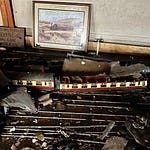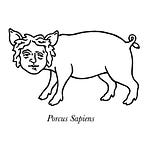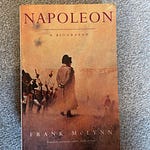Here it is, my first reading aloud of one of my own Substack pieces: ‘Of Burns and Dawkins: Some Interesting Connections.’ Again, apologies for my amateurishness: I am not a voice artist, nor do I have any professional sound recording/editing facilities. For all that, I think it came off tolerably well.
I was going to record a little extra at the end, but I forgot to do so. I wanted to re-share a relevant section from my Areo Magazine review of Dawkins’ 2021 essay collection Books Do Furnish a Life. I wish I’d included something along these lines in the original piece, but I said it pretty well in Areo, so appending an excerpt from my review here should suffice:
In “Worlds in Microcosm,” Dawkins discusses models: things that look like, and can help us think about, real and highly complex systems (his examples include weather simulations and arcade games as well as animal bodies and gene pools, which model the ancestral environments of a species). He also looks at the nature of our—and other animals’—brains, and how they simulate internal models of the world (what you see is not what is out there: rather, you see the model of the world your brain has created out of the information it has received from the rest of the nervous system). The uniqueness of human brains comes from the ability to project our internal simulations forward into the future:
And once natural selection had built brains capable of simulating slight departures from reality into the imagined future, a further emergent capacity automatically flowered. Now it was but another short step to the wilder reaches of imagination revealed in dreams and in art, an escape from mundane reality that has no obvious limits.
Our imaginative and scientific prowess come from something longstanding and deep inside us, a result of a process that, over billions of years, has also seeded the planet with the most extraordinary beings, that is part of our fundamental nature as human animals and that connects us to the rest of earthly life. Is that not wonderful?
In his introduction, Dawkins ponders why fiction appeals to us. Could this deep evolutionary aspect of our minds be part of the explanation? We are master simulators and expert modellers, and what is fiction if not simulation on steroids? Every writer simulates worlds of her own, projecting into the future, the past and the non-existent to probe and analyse the world around her. The same is true of other art forms, going right back to the prehistoric cave paintings created by our ancient predecessors, who depicted the beasts of their world as well as themselves. What is this if not simulation? Could such imaginative powers, fossilised in the form of cave paintings, have helped our forebears survive and reproduce, by helping them to plan hunts, for example, as well as being—if indeed they were—expressive? Could our capabilities as simulators have allowed us to externalise our models in the name of survival and reproduction, and thence to build civilisations, create art and pursue science?
The literary images that Dawkins discusses as essential elements of literary science, and which he himself crafts and uses both skilfully and prodigiously, could also be seen as models of what they are discussing. “Trick of Life”: is that not a model of the problem of biological complexity? Isn’t the idea of the extended phenotype a model or simulation? Is all imagery understandable in this vein?














Share this post